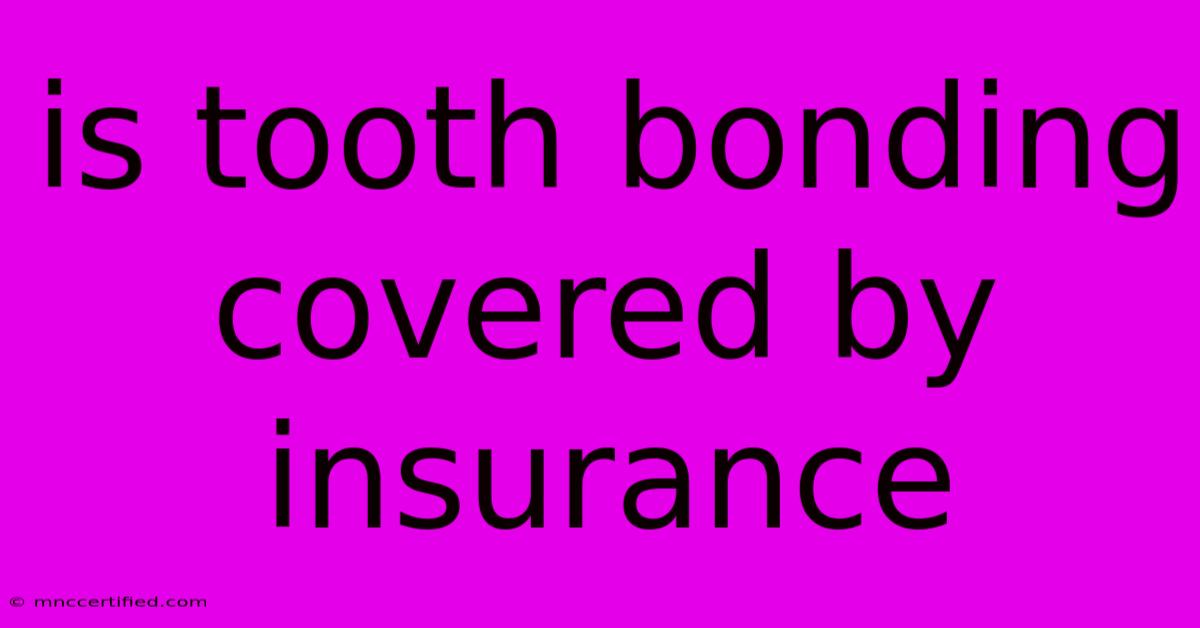Is Tooth Bonding Covered By Insurance

Table of Contents
Is Tooth Bonding Covered by Dental Insurance? A Comprehensive Guide
Tooth bonding is a popular cosmetic dental procedure that can fix chipped, cracked, or discolored teeth. It's a relatively quick and affordable procedure, but you might be wondering: is tooth bonding covered by dental insurance?
The answer, unfortunately, isn't a simple yes or no. Dental insurance coverage for tooth bonding varies widely depending on several factors, including:
- Your insurance plan: Different dental insurance plans have different coverage for cosmetic procedures. Some plans may cover bonding for functional reasons, such as repairing a chipped tooth, but not for purely aesthetic purposes.
- Your reason for bonding: As mentioned above, insurance is more likely to cover bonding if it's medically necessary to repair a damaged tooth, rather than solely for cosmetic enhancement.
- Your location: Coverage can vary depending on the state or region you live in.
- Your dentist: Some dentists may have negotiated higher coverage rates with certain insurance companies, while others may have lower rates.
Here's a breakdown of common scenarios:
When Tooth Bonding is More Likely to Be Covered:
- Repairing a chipped or cracked tooth: If bonding is used to repair a broken tooth that is affecting your ability to chew or causing pain, it's more likely to be covered.
- Closing gaps between teeth: Bonding can sometimes be used to close small gaps between teeth, and insurance may cover this if it's considered a functional issue.
- Fixing a decayed tooth: If bonding is used to repair a decayed tooth, it's more likely to be covered by insurance.
When Tooth Bonding is Less Likely to Be Covered:
- Cosmetic enhancement: If the primary reason for bonding is to improve the appearance of your teeth, such as changing their shape or color, it's less likely to be covered by insurance.
- Multiple teeth: If you're getting bonding on multiple teeth, it's less likely to be fully covered.
- Non-essential procedures: If the bonding is considered a non-essential cosmetic procedure, it's less likely to be covered by insurance.
How to Find Out If Your Insurance Covers Tooth Bonding:
- Review your policy: Carefully check your dental insurance policy to see what procedures are covered and under what circumstances.
- Contact your insurance company: Call your insurance provider directly and ask about their coverage for tooth bonding.
- Ask your dentist: Your dentist is familiar with your insurance plan and can help you determine what services are covered.
Tips for Getting the Most Out of Your Coverage:
- Be upfront with your dentist about your reasons for bonding. This will help your dentist understand whether the procedure is medically necessary or solely for aesthetic purposes.
- Explore alternative options. If your insurance doesn't cover bonding, your dentist might suggest alternative options, such as veneers or dental crowns, which may be partially covered.
- Consider a dental savings plan. If your insurance doesn't cover bonding, you might consider a dental savings plan, which can help you save money on out-of-pocket costs.
Conclusion
While the coverage for tooth bonding can be a bit complicated, understanding the factors that influence it can help you make informed decisions about your dental care. By carefully reviewing your policy, contacting your insurance company, and consulting with your dentist, you can determine whether tooth bonding is a financially feasible option for you. Remember, it's always best to discuss your coverage and options with your dental insurance provider and your dentist to ensure you have a clear understanding of the costs involved.

Thank you for visiting our website wich cover about Is Tooth Bonding Covered By Insurance. We hope the information provided has been useful to you. Feel free to contact us if you have any questions or need further assistance. See you next time and dont miss to bookmark.
Featured Posts
-
Momcozy Breast Pump Through Insurance
Nov 10, 2024
-
Ohio State Vs Purdue Live Stream Tv Channel
Nov 10, 2024
-
Cause Of Prospect Park Brush Fire Under Investigation
Nov 10, 2024
-
Crow With Knife Price Prediction 2025
Nov 10, 2024
-
Helen Flanagans Real Hair Before Extensions
Nov 10, 2024